Cremation, Caste, and Cosmogony in Karmic Traditions.
Cremation, Caste, and Cosmogony in Karmic Traditions.
Cremation, Caste, and Cosmogony in Karmic Traditions.
Create successful ePaper yourself
Turn your PDF publications into a flip-book with our unique Google optimized e-Paper software.
The next day Jagadb<strong>and</strong>hu arranged a court of justice,<br />
<strong>and</strong> told that there is only one caste or community <strong>in</strong> this<br />
world, which is the human community, <strong>and</strong> from that<br />
day Jagadb<strong>and</strong>hu fought aga<strong>in</strong>st untouchability. Thus,<br />
the difference between people is only between those who<br />
follow the Sri Hari consciousness (Jagadb<strong>and</strong>hu) <strong>and</strong><br />
those who do not (ibid:42-43); “He who is deeply<br />
absorbed <strong>in</strong> the Sri Hari consciousness <strong>and</strong> who<br />
cont<strong>in</strong>uously chants His Name, is def<strong>in</strong>itely a superman.<br />
No dist<strong>in</strong>ction can be made on the basis of caste or birth.<br />
Superiority or <strong>in</strong>feriority of man has to be judged by the<br />
<strong>in</strong>tensity or the degree of his adherence…He alone is<br />
untouchable who keeps himself away from the touch of<br />
Sri Hari” (Dutta 1994:44).<br />
Jagadb<strong>and</strong>hu – Sri Chaitanya Mahaprabhu – said; “Low<br />
caste persons who worship the Godhead are better than<br />
those Brahm<strong>in</strong>s who do not worship” (Dutta 1994:44),<br />
<strong>and</strong> he cont<strong>in</strong>ued, “low-caste is not unsuitable for<br />
worshipp<strong>in</strong>g Krishna, High-caste Brahm<strong>in</strong> is not suitable<br />
for worshipp<strong>in</strong>g Krishna, He is great who worships,<br />
worst is the non-worshipper, No scrut<strong>in</strong>y of caste <strong>and</strong><br />
community is Krishna worship” (ibid). These quotations<br />
are frequently used by the Mohantas <strong>and</strong> have a<br />
fundamental role <strong>in</strong> their identity as a group, not as a<br />
schedule caste or low-caste but as a group higher than<br />
the Brahmans, or even above the caste system. There<br />
are, however, other reasons why Jagadb<strong>and</strong>hu started<br />
<strong>in</strong>clud<strong>in</strong>g the outcastes <strong>in</strong>to the caste system <strong>and</strong> granted<br />
them equal privileges as humans <strong>and</strong> H<strong>in</strong>dus.<br />
Jagadb<strong>and</strong>hu came at a time when people were<br />
suppressed by the tyranny of Brahmans as well as other<br />
forms of oppression. Christian missionaries tried to<br />
convert the Buno-Bagdis <strong>in</strong>to Christianity, which made<br />
Jagadb<strong>and</strong>hu upset. The Buno-Bagdis lived <strong>in</strong> Faridpur,<br />
<strong>and</strong> they were highly demoralised <strong>and</strong> accustomed to an<br />
ugly life-style. Society did not accept them, <strong>and</strong> they<br />
were alienated from ma<strong>in</strong>stream H<strong>in</strong>duism. Seven<br />
thous<strong>and</strong> “Bunos” were converted by Rev. A. Chillas<br />
Midd. When Jagadb<strong>and</strong>hu got this news he went to<br />
Rajani, who was the leader of the community. The Lord<br />
asked him; “Rajani, you are go<strong>in</strong>g to be Christian?<br />
Why?” Rajani replied humbly, “Prabhu! We are<br />
untouchables. Everyone hates us. We have no place <strong>in</strong><br />
H<strong>in</strong>du society. We want to get rid of this unbearable<br />
situation by adopt<strong>in</strong>g Christianity”. The Lord sharply<br />
replied, “Who says you are base? You are men. You are<br />
the creatures of “Sri Hari”. From today onwards your<br />
clan will be known as “Mohanta” (fig. 6.2). Rajani<br />
praised the lotus-feet of Jagadb<strong>and</strong>hu, <strong>and</strong> received a<br />
new life, <strong>and</strong> all the Mohantas received the bless<strong>in</strong>gs of<br />
Jagadb<strong>and</strong>hu <strong>and</strong> moved from the world of darkness to<br />
the world of light. From that day they were no longer<br />
untouchables, but earned a reputation as chanters of<br />
Har<strong>in</strong>am <strong>and</strong> beaters of drums (ibid:50). Jagadb<strong>and</strong>hu<br />
elevated Rajani Bagdi to the status of “Haridas<br />
Mohanta”, <strong>and</strong> he was granted the privilege of giv<strong>in</strong>g the<br />
lord water (ibid:45). The “Buno-Bagdis” <strong>and</strong> other lowcastes<br />
were treated as equal <strong>in</strong> the Sri Angan Ashram,<br />
<strong>and</strong> they were allowed to prepare the meal for the prabhu<br />
91<br />
<strong>and</strong> worship <strong>in</strong> the temple. Thus, Jagadb<strong>and</strong>hu replaced<br />
the lowest castes with the most respectable <strong>and</strong> adorned<br />
position of the Brahm<strong>in</strong>s (ibid:46).<br />
Jagadb<strong>and</strong>hu did not consider anyth<strong>in</strong>g impure, <strong>and</strong> he<br />
said, “whatever I touch becomes pure <strong>and</strong> holy” (Dutta<br />
1994:65), <strong>and</strong> this is per se a div<strong>in</strong>e <strong>and</strong> holy capability.<br />
His teach<strong>in</strong>g was twofold; practice <strong>and</strong> s<strong>in</strong>g<strong>in</strong>g. “Be<strong>in</strong>g<br />
engrossed <strong>in</strong>to the Ocean of His own thought, He<br />
allowed His div<strong>in</strong>e pen to reveal spiritually allegorical<br />
truth for the benefit of His created be<strong>in</strong>gs. Most of the<br />
contents are beyond human comprehension. Even then,<br />
some portions of this holy book makes highly absorb<strong>in</strong>g<br />
<strong>and</strong> <strong>in</strong>terest<strong>in</strong>g read<strong>in</strong>g – though not wholly <strong>in</strong>telligible”<br />
(ibid:63). Lord Shri Chaitanya <strong>in</strong>itiated kirtan – a<br />
worshipp<strong>in</strong>g celebrated <strong>in</strong> songs <strong>and</strong> glorifications of<br />
God, <strong>and</strong> this mode of worship was perfected by<br />
Jagadb<strong>and</strong>hu, who is seen as the embodiment of kirtan<br />
(ibid:16-17). The songs composed by Jagadb<strong>and</strong>hu are<br />
perceived as super-excellent <strong>and</strong> uttermost holy<br />
(ibid:61). To Jagadb<strong>and</strong>hu, kirtan was “not merely a<br />
source of <strong>in</strong>spiration, rather it was the only method of<br />
universal emancipation”, <strong>and</strong> he said, “if kirtan is<br />
propagated, the creation would be protected”, <strong>and</strong> the<br />
Buno-Bagdis saw the light <strong>and</strong> changed their way of<br />
liv<strong>in</strong>g under the <strong>in</strong>fluence of kirtan (ibid:72).<br />
Jagadb<strong>and</strong>hu <strong>in</strong>structed his followers to perform kirtan<br />
everywhere <strong>and</strong> at every time, “chant Kirtan with<br />
danc<strong>in</strong>g. All s<strong>in</strong>s wash out if you can dance properly”<br />
(ibid:95). Jagadb<strong>and</strong>hu died Asw<strong>in</strong> 1 <strong>in</strong> the Bengali year<br />
1328 (1921 CE). In their confusion <strong>and</strong> lamentation after<br />
los<strong>in</strong>g their lord, the devotees started chant<strong>in</strong>g<br />
“Mahanam Kirtan”, <strong>and</strong> hoped that Jagadb<strong>and</strong>hu would<br />
return to life when hear<strong>in</strong>g the chant<strong>in</strong>g, but the lord did<br />
not wake up. On the 12 th day, Krishnadasji, a true<br />
devotee, <strong>in</strong>formed the others that he had got <strong>in</strong>structions<br />
from Jagadb<strong>and</strong>hu <strong>in</strong> a dream that he would not return to<br />
earth for the time be<strong>in</strong>g, <strong>and</strong> they should bury him after<br />
hav<strong>in</strong>g performed proper rituals. The kirtan stopped, <strong>and</strong><br />
there was a great sorrow among the devotees. After<br />
discussions among the disciples, they came to the<br />
conclusion that Jagadb<strong>and</strong>hu would return <strong>in</strong> the same<br />
body one day, a promise also given by the lord himself.<br />
So with a gap of three weeks, the chant<strong>in</strong>g of kirtan<br />
started aga<strong>in</strong> Kartik 2 nd <strong>in</strong> 1328, <strong>and</strong> this “Mahakirtan”<br />
has cont<strong>in</strong>ued un<strong>in</strong>terruptedly s<strong>in</strong>ce then, it cont<strong>in</strong>ues<br />
today, <strong>and</strong> the devotees’ cont<strong>in</strong>ued chant<strong>in</strong>g shall br<strong>in</strong>g<br />
back Jagadb<strong>and</strong>hu (ibid:98-100).<br />
Sri Angan Ashram <strong>and</strong> the disciples<br />
The cult <strong>in</strong> the Ashram <strong>and</strong> Faridpur has to be<br />
understood <strong>in</strong> relation to how Jagadb<strong>and</strong>hu is perceived.<br />
Jagadb<strong>and</strong>hu is a type of Godhead which best can be<br />
understood when compared to Christ because they share<br />
many similar features, <strong>and</strong> <strong>in</strong>deed, the disciples<br />
compared him with Jesus <strong>in</strong> Christianity <strong>and</strong> Mohammed<br />
<strong>in</strong> Islam. Jagadb<strong>and</strong>hu was float<strong>in</strong>g on the river when he<br />
meditated sitt<strong>in</strong>g <strong>in</strong> the lotus position (figs. 6.3-6.4).


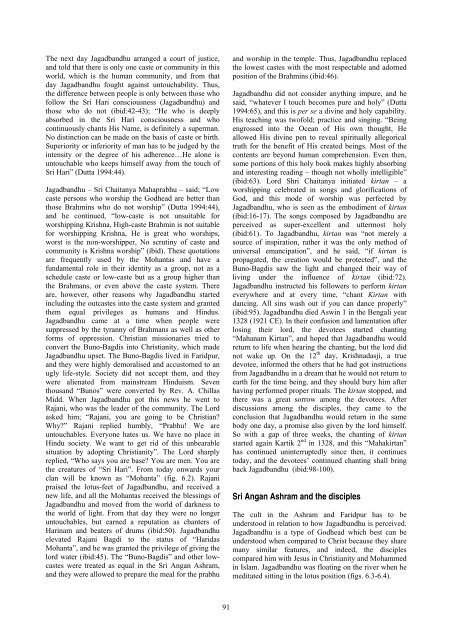
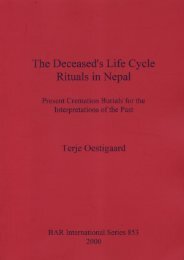


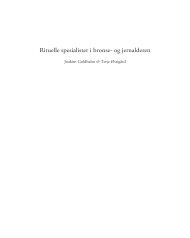
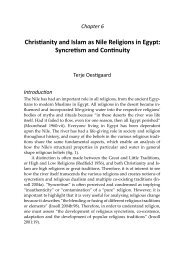
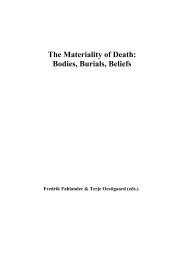


![Fullmono-AK [P2118].indd - oestigaard](https://img.yumpu.com/18994998/1/177x260/fullmono-ak-p2118indd-oestigaard.jpg?quality=85)